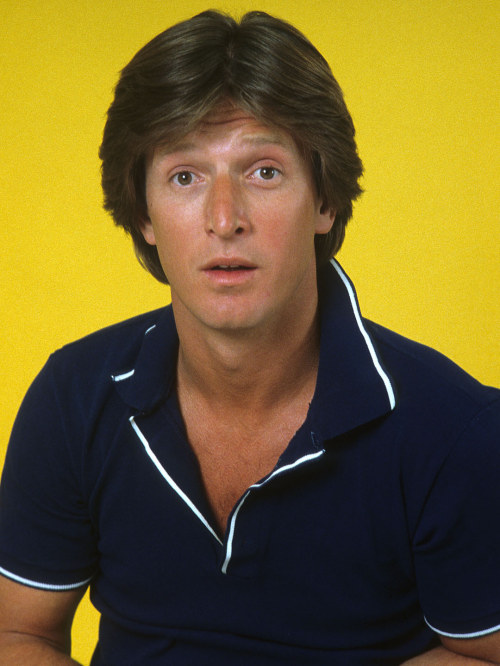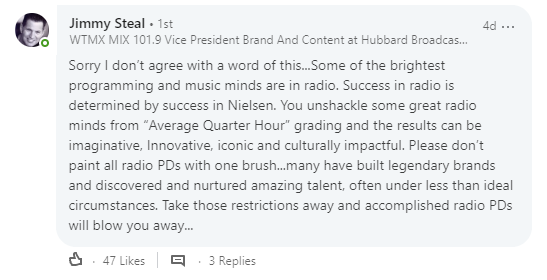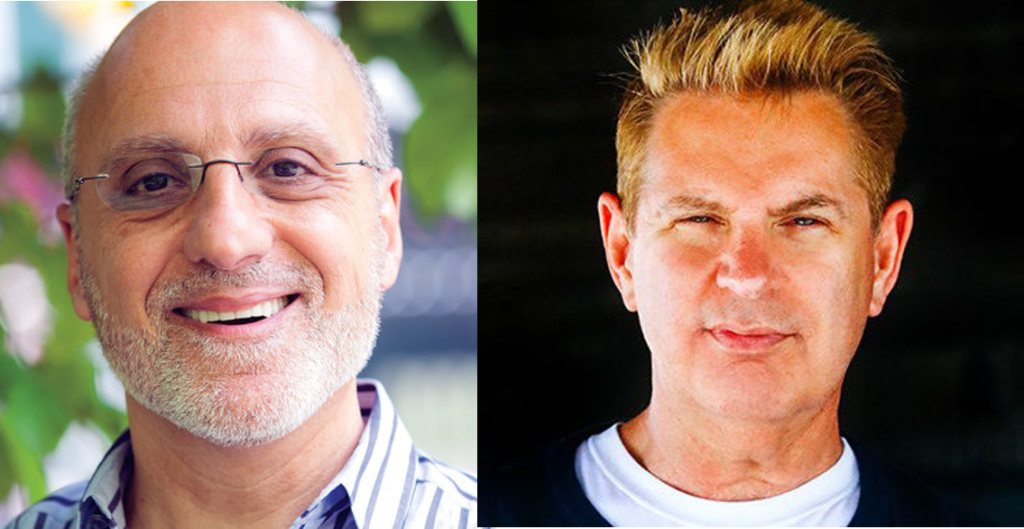
Today’s #TBT blog post is exactly three years old, talking about some of my favorite people in the radio business – PDs, program directors, content creators. Never could I have imagined when I wrote this post in the Fall of 2019 the position would end up on the “endangered radio job list.” But in the post-pandemic/recession paranoid period in which we live, programmers are finding themselves on the bubble as RIFs continue to permeate the radio trade press.
As a member of this august fraternity, I’m just a wee bit biased about their value to the radio broadcasting – and media – businesses. When we lovingly talk about the benefits of curation in media, let’s not forget they are the curators. And while it is true that some companies may, in fact, be “top down” when it comes to local programming, most are not. By and large, radio programmers are still programming radio. While their budgets may not be what they used to be, most are very much making the moves we hear when we tune in their stations. In fact, the lack of money in these belt-tightening times has made the best PDs in class even more resourceful.
The story that precipitated this post back in 2019 was a big job opening at Spotify, and the stated “qualifications” that would guide filling this position. In today’s post, I name names – several of whom are still programming for the stations or organizations listed in this post. But some have moved on. When I wrote the post, ex-91X mastermind, Kevin Stapleford, was programming for Slacker; now he’s working his magic at Pandora.
But it is also a fact that the company that stimulated this post – Spotify – has perhaps made the case that tech companies might not always appreciate the mercural genius of great radio programmers. In just the past few years, the Swedish streaming giant has found a way to let two of the smartest programmers I know – Tom Calderone and Kevin Weatherly – get away. I’m not sure what that says about the ability of technology organizations to appreciate the raw genius of great programmers. Sometimes, tech companies fail to grasp the concept of great talent, especially when it doesn’t have data behind it.
You’d hope that organizations formerly known as “radio broadcasting companies” – they want you to now call them “media entertainment brands” – don’t make the same mistakes as Spotify and others have – letting some of their brightest programmers go, in an effort to “spreadsheet save” their way to fiscal prudence while setting up their companies and clusters for mediocrity and irrelevance. Too often, we’ve seen radio companies jettison their PDs while they hire yet another chief revenue officer or corporate biz dev executive.
I’ve heard it said – with all due respect intended – that most radio salespeople are a-dime-a-dozen. (I don’t believe that BTW.)
Programmers aren’t. Someone still has to create that content you’re trying to monetize. – FJ
September 2019
That look on Andy Travis‘ face at the top of this post says it all about the rigors and difficulties of radio programming. In case you don’t know, Andy is a fictional character – the PD of the famous “WKRP In Cincinnati” sitcom that had a nice run on CBS back in the ’80s. It’s a look that combines surprise with knowledge; with understanding but the realization there’s another impossible challenge just around the corner.
Andy was the peacemaker, the voice of reason, the guy who always had a vision for WKRP, despite the many distractions that afflict so many programmers – the bumbling GM, the amoral sales manager, difficult-to-manage air personalities – and the other stresses all part of what makes being the PD an often thankless job – but perhaps the best gig in radio because it’s the most creative and challenging.
Of course, in the real world of radio programming, Andy might struggle to keep up with the changes and the pressures. Not everyone who programmed in the WKRP Era is still plying their craft today in radio broadcasting. In fact, some are selling real estate, while some have sadly passed away.
But none of that changes the fact that being at the helm of a radio station in 2019 is still the toughest job in radio, if not in media. While other metrics are now very much in play throughout the entertainment and information ecosphere, the ratings pressure hasn’t subsided for radio programmers one iota.
So, while other programmers can boast of being commercial free with infinite playlist choices, radio PDs are in that tenuous position of having to achieve mass appeal success whether they’re in New York City or Nome.
And today, radio programmers are tasked with helping to generate revenue as well – even if their ratings are competitive or even stellar. And because they’re content creators, they are often responsible for what their brand is doing in social media, on their app, on smart speakers, podcasts, the website, and even with how their brand’s merch looks. Many are booking concerts and festivals, and they are responsible for keeping an intricate promotional matrix together, ensuring that talent, sales, and promotions are all doing their jobs.
That’s why a music industry news story – and a fascinating exchange on LinkedIn – caught my eye last week. It all started over the news that Spotify’s Head of Music, Nick Holmstén, was stepping down. Variety‘s Jem Aswad theorized Holmstén’s job had become too big – covering playlists, editorial, and artist relations. There’s been much turnover at Spotify, but that isn’t stopping the company from actively search for Holmstén’s replacement.
And that’s the news that led Allen Kovac, CEO of E7LG/Tenth Street Entertainment, to take to LinkedIn to offer up an opinion about the kind of person Spotify should be – and should not be – considering to take over Holmstén’s chair.
Here’s Kovac’s post:
Kovac’s plea to Spotify – whatever you do, don’t hire a radio PD – stirred up reaction, as you may have guessed. Some agreed with him, while others pushed back – in some cases, hard.
One of the most vocal – and thoughtful – reactions came from one of the best radio programmers in the business bar none – Jimmy Steal. He’s well-known in the industry, especially for his dynasty-building run at Power 106 in L.A. Jimmy is now leading the charge at Hubbard’s juggernaut in Chicago, WTMX – The Mix.
So, when Jimmy spoke up, it caught my attention:

In other words, great programmers can program…anything.
They walk into restaurants and wonder why that music is playing or why the most popular dishes aren’t better showcased on the menu. They watch cable news channels and moan about the lack of forward momentum and occasion setting. They attend weddings and Bar Mitzvahs and criticize the DJ’s choices and lame talk-ups.
That’s because every piece of content and the environment in which it lives should have a strategy, a purpose, a flow, a continuity – whether it’s a gas station, a car dealership, or a streaming music service. That’s what programmers think about.
And PDs are adaptable. Switch from diaries to meters, they’ll figure it out. Add a few units to make the quarter, they’ll find a way to squeeze them in. Make sure that remote is covered, they’ll find a way.
It also didn’t escape my attention – nor should it yours – that earlier this week, it was announced that veteran radio PD,  Alex Tear, had landed a new gig – VP/Music Curation and Programming for Pandora and SiriusXM. Not bad for a Top 40 commercial radio guy.
Alex Tear, had landed a new gig – VP/Music Curation and Programming for Pandora and SiriusXM. Not bad for a Top 40 commercial radio guy.
Here’s how his boss, Scott Greenstein, defines Tear’s new marching orders:
“(Tear will partner with programming teams to) further build Pandora’s listener base and maximize music assets across both the Pandora and SiriusXM platforms. More specifically, he will work closely with Pandora’s music genre leaders on refining top curated stations and playlists, and further defining strategy and execution of mood and activity programming along with new artist development.”
That’s nothing new, because that’s pretty much what Tear has done throughout his entire broadcasting career. And if a radio PD is good enough for Pandora, it makes you question Kovac’s premise that Spotify should be looking elsewhere.
And when he walks through the halls of SiriusXM (and now Pandora) in Manhattan, Tear will not be a stranger. The place is teeming with former radio broadcasting programmers and marketers who seamlessly adapted to satellite radio.

A look at other tech companies reveals scores of other former programmers, including Alex Luke (Amazon), Suzy Cole (Apple), Kevin Stapleford (Slacker), and many, many others.
And let’s not forget the early days of MTV and Vh1 were guided by former radio programmers; visionaries like Bob Pittman, Jarl Mohn (Lee Masters), and Jeff Rowe (Dallas Cole).
That because great programmers just program. Look inside the brains of Alex Tear, Terrie Carr, Dave Richards, Mike Thomas, or Jimmy Steal and you’ll find essentially the same neurons.
These pros have similar skill sets – they know how to build audiences, they “get” the essence of entertaining, and they know a thing or two about brand building – almost always in a challenging, changing environment.
With passion.
Haters gonna hate.
Radio programmers gonna program.
Spotify could do a lot worse.
P.S. Since this post was first published three years ago, both Calderone and Weatherly have returned to the terrestrial radio world. Tom joined Buffalo Toronto Public Media (WNED, WBFO, and the Bridge) as the organization’s CEO. And while they say you never can go back (“they” are wrong), Kevin is back at KROQ, trying to turn around one of the greatest brands in radio – KROQ – the one he built.
RIFs might save an organization money – initially. But you have to wonder about their costs to organizations and brands when all is said and done. (Sigh) Another topic for another day. – FJ
- In Radio, You Just Never Know - April 17, 2025
- The Secret To Making A Great Podcast (And Great Radio) - April 16, 2025
- I Read The (Local) News Today, Oh Boy! - April 15, 2025





Excellent basics don’t have to demand big investment. Content, connection, comfort, creativity and presentation create the secret sauce. Just focus on real radio.
Sometimes, it’s that simple, Clark!
On one level, I knew I was going to agree with this before I even started reading it. One of my many friends in the business is Chuck Southcott, who is probably best known for his years programming the satellite-delivered version of “The Music Of Your Life” some two decades ago. I’ve known him since he was the PD at KGIL here in the San Fernando Valley and he still lives here, less than five miles from me. We were talking about how many failed stations and formats we had seen over the years, and he came up with these words of wisdom:
“You cannot teach someone how to program a radio station. You either instinctively know how to do it, or you do not.”
My God, I thought, the man’s 100% correct. How much of a PD’s job is trusting their instincts?
Then I read this, and I realized how much more I agree with it. I’m exactly like that in pretty much my entire life; I can look at almost anything and figure out how to do it better. (And that served me well when I spent 11 years as a regional governing official at Metro here in L.A., on a service council whose main responsibility was the routing and service frequency of bus service in our region. And I got that appointment because I had gained a reputation previously for inundating the service planners with suggestions for changes and tweaks.)
I guess we all just have the right mindset to do this. Maybe that’s why we still love the business and stay in it!
I agree and I don’t, K.M. I believe instincts play a big role. So does a certain perfectionist desire to make it great (or as good as you can), whatever ‘it” might be. And then there’s a curiosity streak that you either possess or you don’t. I also believe it’s two other things – the ability to anticipate problems (“What can go wrong?”) and then a strong problem-solving ability (“Exactly ‘what’s wrong?’ and how can we fix it?”). Now that I’m rereading yours and Chuck’s comments, there’s a book here. OK, maybe a blog post. Thanks for chiming in on this one.
I’m going to agree with your first point of disagreement, Paul. I think the same instincts we have as programmers embed that perfectionist desire (and yes, I’m one of those as well). I half-agree with your second point, because I’m not as good at anticipating problems, unless I see something happening that I have experienced before at another station … but I am really good at evaluating problems and finding the fix.
But the key point, which you made three years ago and which is so obviously still valid today, is that radio programmers inherently have the skills to do this, and my friend Mr. Southcott is also correct. I can teach someone how to run the scheduling software and tweak the fails, but I can’t teach someone how to do the entire job. We either know how to do it — and those of us that do are still here — or we don’t, and end up in real estate sales.
But that’s also why I am glad you still write this blog, Paul. I relate to your mindset and I get as much out of validating my own thought process as I do about the revelations you make here. (And both of those reasons are why I am thankful for the comments you allow to be made and read.)
This “Paul” stuff is obviously getting contagious.
Brain freeze, Fred. Sorry.
Guess I appreciate both of the Jacobs brothers in equal amounts!